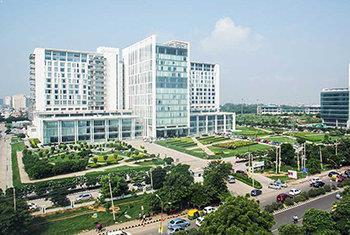Kidney Stones Removal Methods
Earlier, an open surgical procedure was conducted to remove stones from the kidney. But with an advancement in medical sciences, open surgery is no longer required to serve the purpose. The following are some of the advanced procedures that are now commonly used for kidney stones removal in India:
Extracorporeal shock wave lithotripsy uses sound waves to remove stones present in the kidneys. Nowadays, it is the most popular method for the management of small-sized to medium-sized kidney stones.
Intense sound waves are produced outside the body and are focused on the stones in the kidney. These sound waves travel through the skin and body tissues to hit the denser stones. Repeated firing of these intense sound waves causes the stones to break into smaller pieces. These smaller pieces can easily pass through the urine via the urinary tract.
Regular penetration of the high-frequency sound waves may alleviate pain in some patients. Therefore, anesthesia is often needed in this procedure. However, this treatment can also be done on an outpatient basis.
Advantages:
- Non-invasive procedure
- Huge success rate
- Minimal discomfort after the procedure
- Can be performed as an outpatient procedure
Limitations: Extracorporeal shock wave lithotripsy is not successful in the treatment of hard stones such as cysteine, calcium oxalate, and calcium phosphate stones. This procedure is also not suitable for stones of larger size.
Complications:
The following complications may arise during or after the procedure:
- Shattered stone particles may cause discomfort a few patients
- They may cause a blockage if they get stuck during urination
- The doctor may need to insert a stent into the ureter to pass the fragmented particles
- Additional treatment may be required in cases where the stone is not completely shattered with just one treatment
Percutaneous nephrolithotomy is a minimally invasive procedure conducted to remove kidney stones. This method is more commonly used to remove larger stones in the kidney.
The urologist makes a small incision in the back of the patient. A nephroscope is passed into the kidney through this tiny incision to locate the stone. The stone is either pulled out or it is fragmented into tiny pieces if the size is large. A laser or pneumatic energy source is used to break the stone into smaller pieces. These smaller pieces are either removed directly or may be left to pass out naturally with the urine.
Advantages:
- The urologist can remove the stones directly instead of relying on natural elimination through urine
- Large and complex stones can also be easily removed with this technique
- Only one procedure is required to remove the stones completely
Limitations: Extremely large and more complex stones are removed in more than one attempt.
Complications: Percutaneous nephrolithotomy may require a tube or stent for temporary drainage after the procedure. Patients on blood-thinning medicines are not advised to opt for this procedure.
Ureteroscopy is the treatment method used to remove kidney stones by using a special telescope, called ureteroscope. It is used to remove small- to medium-sized kidney stones located in any part of the urinary tract or kidney.
The urologist passes the ureteroscope through the urinary opening into the ureter via the urinary bladder. After detecting the location of the stone, the urologist targets a laser onto the stone to break it into smaller pieces.
These small fragments of the stone are either extracted or they are left to pass out with the urine. A stent may be placed inside temporarily to allow the pieces to drain out into the bladder.
Advantages:
- It has a higher success rate and results in complete removal of small-to-medium-sized stones
- Can be performed without stopping blood-thinning medicines
- Hard stones can be removed with the help of ureteroscopy
- No incision is required
- It is an outpatient procedure
Limitations: Ureteroscopy cannot be used to remove large-sized stones.
Complications: Ureters are at a high risk of damage.














